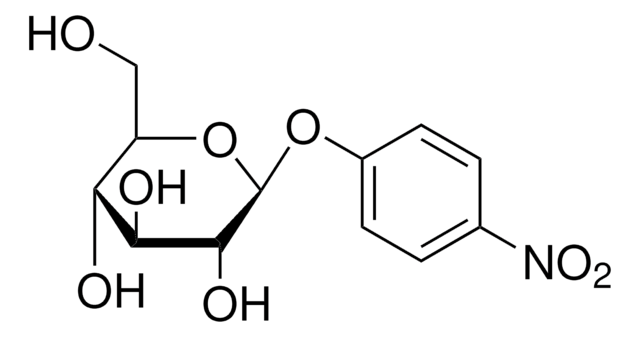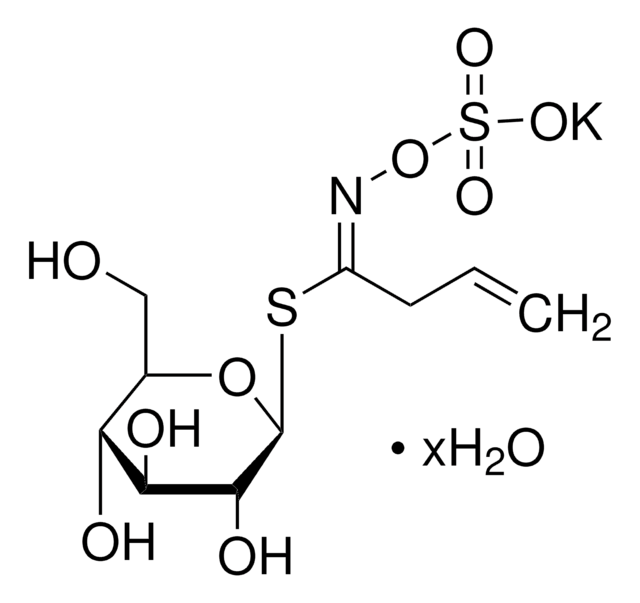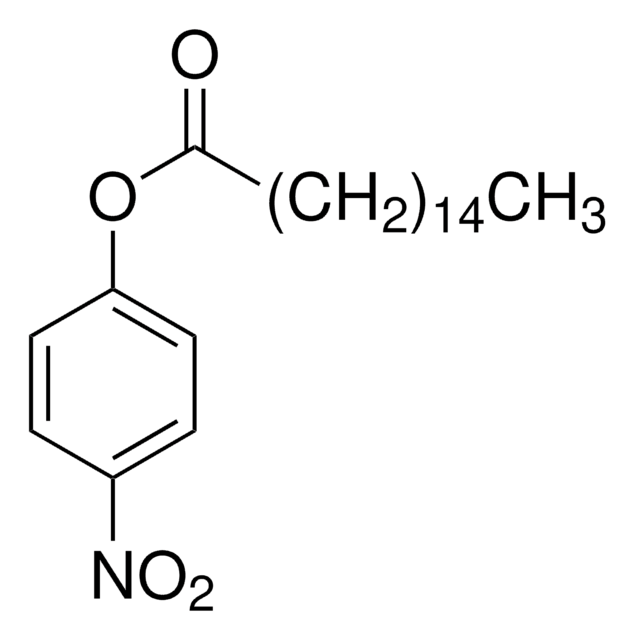1048
4-Nitrophénol
spectrophotometric grade
Synonyme(s) :
p-Nitrophenol
About This Item
Produits recommandés
Qualité
spectrophotometric grade
Niveau de qualité
Pression de vapeur
0.6 mmHg ( 120 °C)
Forme
powder
Température d'inflammation spontanée
541 °F
Technique(s)
UV/Vis spectroscopy: suitable
Point d'ébullition
279 °C (lit.)
Pf
110-115 °C (lit.)
Solubilité
ethanol: 95%, clear, dark yellow (100 mg/mL)
Chaîne SMILES
O=N(C1=CC=C(O)C=C1)=O
InChI
1S/C6H5NO3/c8-6-3-1-5(2-4-6)7(9)10/h1-4,8H
Clé InChI
BTJIUGUIPKRLHP-UHFFFAOYSA-N
Informations sur le gène
human ... UGT1A4(54657)
Vous recherchez des produits similaires ? Visite Guide de comparaison des produits
Application
- Spectroscopic monitoring of polyurethane-based nanocomposite as a potential catalyst for the reduction of dyes.: This research explores the use of a polyurethane-based nanocomposite incorporating 4-Nitrophenol for spectroscopic monitoring and catalysis. The study demonstrates its effectiveness in reducing dye concentrations, providing a valuable tool for environmental cleanup and chemical processing industries (Alam K et al., 2024).
- Silica@poly(chitosan-N-isopropylacrylamide-methacrylic acid) microgels: Extraction of palladium (II) ions and in situ formation of palladium nanoparticles for pollutant reduction.: Discusses the synthesis and application of innovative microgels that utilize 4-Nitrophenol in processes for extracting palladium ions and reducing pollutants. This highlights its utility in heavy metal remediation and nanoparticle synthesis, relevant for environmental and materials science (Alzahrani AYA et al., 2024).
- Reaction mechanisms of chlorinated disinfection byproducts formed from nitrophenol compounds with different structures during chlor(am)ination and UV/post-chlor(am)ination.: Examines how 4-Nitrophenol and similar compounds react under different water treatment processes, providing insights into the formation and control of disinfection byproducts. This is crucial for improving water treatment safety and effectiveness (Prasad Singh R et al., 2024).
- Comprehensive Studies of Adsorption Equilibrium and Kinetics for Selected Aromatic Organic Compounds on Activated Carbon.: This study provides a detailed analysis of 4-Nitrophenol adsorption on activated carbon, offering valuable data on its behavior in water treatment systems. The findings are critical for designing more efficient adsorption processes to remove contaminants from water (Marczewski AW et al., 2024).
Mention d'avertissement
Warning
Mentions de danger
Conseils de prudence
Classification des risques
Acute Tox. 4 Dermal - Acute Tox. 4 Inhalation - Acute Tox. 4 Oral - STOT RE 2 - STOT RE 2 Oral
Organes cibles
Kidney,Liver
Code de la classe de stockage
6.1C - Combustible acute toxic Cat.3 / toxic compounds or compounds which causing chronic effects
Classe de danger pour l'eau (WGK)
WGK 2
Point d'éclair (°F)
336.2 °F
Point d'éclair (°C)
169 °C
Équipement de protection individuelle
dust mask type N95 (US), Eyeshields, Faceshields, Gloves
Faites votre choix parmi les versions les plus récentes :
Déjà en possession de ce produit ?
Retrouvez la documentation relative aux produits que vous avez récemment achetés dans la Bibliothèque de documents.
Les clients ont également consulté
Notre équipe de scientifiques dispose d'une expérience dans tous les secteurs de la recherche, notamment en sciences de la vie, science des matériaux, synthèse chimique, chromatographie, analyse et dans de nombreux autres domaines..
Contacter notre Service technique








